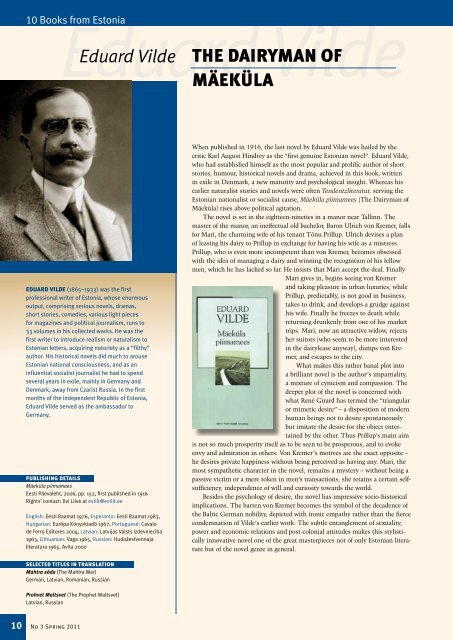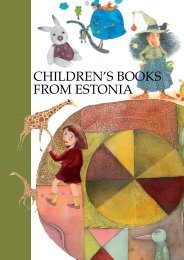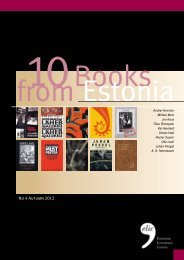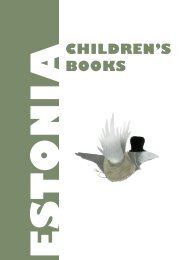No 3 Spring 2011 - Estonian Literature
No 3 Spring 2011 - Estonian Literature
No 3 Spring 2011 - Estonian Literature
Create successful ePaper yourself
Turn your PDF publications into a flip-book with our unique Google optimized e-Paper software.
10<br />
<strong>No</strong> 3 <strong>Spring</strong> <strong>2011</strong><br />
Eduard Vilde<br />
Eduard Vilde<br />
The dairyMaN Of<br />
10 Books from Estonia<br />
edUard ViLde (1865–1933) was the first<br />
professional writer of Estonia, whose enormous<br />
output, comprising serious novels, dramas,<br />
short stories, comedies, various light pieces<br />
for magazines and political journalism, runs to<br />
33 volumes in his collected works. He was the<br />
first writer to introduce realism or naturalism to<br />
<strong>Estonian</strong> letters, acquiring notoriety as a “filthy”<br />
author. His historical novels did much to arouse<br />
<strong>Estonian</strong> national consciousness, and as an<br />
influential socialist journalist he had to spend<br />
several years in exile, mainly in Germany and<br />
Denmark, away from Czarist Russia. In the first<br />
months of the independent Republic of Estonia,<br />
Eduard Vilde served as the ambassador to<br />
Germany.<br />
PUbLishiNG deTaiLs<br />
Mäeküla piimamees<br />
Eesti Päevaleht, 2006, pp. 152, first published in 1916<br />
Rights’ contact: Ilvi Liive at estlit@estlit.ee<br />
English: Eesti Raamat 1976, Esperanto: Eesti Raamat 1983,<br />
Hungarian: Európa Könyvkiadó 1967, Portuguese: Cavalo<br />
de Ferro Editores 2004, Latvian: Latvijas Valsts izdevnieciba<br />
1963, Lithuanian: Vaga 1965, Russian: Hudožestvennaja<br />
literatura 1965, Avita 2000<br />
seLecTed TiTLes iN TraNsLaTiON<br />
Mahtra sõda (The Mahtra War)<br />
German, Latvian, Romanian, Russian<br />
Prohvet Maltsvet (The Prophet Maltsvet)<br />
Latvian, Russian<br />
MäeKüLa<br />
When published in 1916, the last novel by Eduard Vilde was hailed by the<br />
critic Karl August Hindrey as the “first genuine <strong>Estonian</strong> novel”. Eduard Vilde,<br />
who had established himself as the most popular and prolific author of short<br />
stories, humour, historical novels and drama, achieved in this book, written<br />
in exile in Denmark, a new maturity and psychological insight. Whereas his<br />
earlier naturalist stories and novels were often Tendentzliteratur, serving the<br />
<strong>Estonian</strong> nationalist or socialist cause, Mäeküla piimamees (The Dairyman of<br />
Mäeküla) rises above political agitation.<br />
The novel is set in the eighteen-nineties in a manor near Tallinn. The<br />
master of the manor, an ineffectual old bachelor, Baron Ulrich von Kremer, falls<br />
for Mari, the charming wife of his tenant Tõnu Prillup. Ulrich devises a plan<br />
of leasing his dairy to Prillup in exchange for having his wife as a mistress.<br />
Prillup, who is even more incompetent than von Kremer, becomes obsessed<br />
with the idea of managing a dairy and winning the recognition of his fellow<br />
men, which he has lacked so far. He insists that Mari accept the deal. Finally<br />
Mari gives in, begins seeing von Kremer<br />
and taking pleasure in urban luxuries, while<br />
Prillup, predictably, is not good in business,<br />
takes to drink, and develops a grudge against<br />
his wife. Finally he freezes to death while<br />
returning drunkenly from one of his market<br />
trips. Mari, now an attractive widow, rejects<br />
her suitors (who seem to be more interested<br />
in the dairylease anyway), dumps von Kremer,<br />
and escapes to the city.<br />
What makes this rather banal plot into<br />
a brilliant novel is the author’s impartiality,<br />
a mixture of cynicism and compassion. The<br />
deeper plot of the novel is concerned with<br />
what René Girard has termed the “triangular<br />
or mimetic desire” – a disposition of modern<br />
human beings not to desire spontaneously<br />
but imitate the desire for the object entertained<br />
by the other. Thus Prillup’s main aim<br />
is not so much prosperity itself as to be seen to be prosperous, and to evoke<br />
envy and admiration in others. Von Kremer’s motives are the exact opposite –<br />
he desires private happiness without being perceived as having any. Mari, the<br />
most sympathetic character in the novel, remains a mystery – without being a<br />
passive victim or a mere token in men’s transactions, she retains a certain selfsufficiency,<br />
independence of will and curiosity towards the world.<br />
Besides the psychology of desire, the novel has impressive socio-historical<br />
implications. The barren von Kremer becomes the symbol of the decadence of<br />
the Baltic German nobility, depicted with ironic empathy rather than the fierce<br />
condemnation of Vilde’s earlier work. The subtle entanglement of sexuality,<br />
power and economic relations and post-colonial attitudes makes this stylistically<br />
innovative novel one of the great masterpieces not of only <strong>Estonian</strong> literature<br />
but of the novel genre in general.







